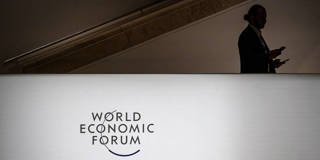Those who gathered in Davos for the World Economic Forum’s annual meeting this year were not wrong to fear that globalization is in retreat for the first time since 1945. Though the economic case for free trade and deepening integration remains sound, it has always been missing a critical element.
CAMBRIDGE – One of the most iconic images of our time shows a polar bear marooned and adrift on an ice floe. Few other images capture the reality of climate change so viscerally. And now, ironically, Davos Man finds himself in a similar metaphorical position. His natural habitat, the hyper-globalized world of the past half-century, is shrinking, and he has gone from skiing in the Swiss Alps to skating on thin ice.
Of course, globalization – the integration of national and regional economies through cross-border trade and investment – long predates Davos Man. Ever since the dawn of industrialization in the 1800s, technological progress (steamships, railroads, the telegraph, automobiles, airplanes) and financial innovations (like the gold standard) have led to an increasingly interconnected global economy.
But this process has not been continuous. An earlier wave of globalization came to an abrupt halt in the early 1900s with the rise of nationalism and protectionism, culminating in the Great Depression and fascism. Yet since the end of World War II, and especially following the Cold War, the international order has been deliberately geared toward American-led globalization, with the Bretton Woods Institutions (the International Monetary Fund, the World Bank, and the World Trade Organization) providing the basic architecture.

CAMBRIDGE – One of the most iconic images of our time shows a polar bear marooned and adrift on an ice floe. Few other images capture the reality of climate change so viscerally. And now, ironically, Davos Man finds himself in a similar metaphorical position. His natural habitat, the hyper-globalized world of the past half-century, is shrinking, and he has gone from skiing in the Swiss Alps to skating on thin ice.
Of course, globalization – the integration of national and regional economies through cross-border trade and investment – long predates Davos Man. Ever since the dawn of industrialization in the 1800s, technological progress (steamships, railroads, the telegraph, automobiles, airplanes) and financial innovations (like the gold standard) have led to an increasingly interconnected global economy.
But this process has not been continuous. An earlier wave of globalization came to an abrupt halt in the early 1900s with the rise of nationalism and protectionism, culminating in the Great Depression and fascism. Yet since the end of World War II, and especially following the Cold War, the international order has been deliberately geared toward American-led globalization, with the Bretton Woods Institutions (the International Monetary Fund, the World Bank, and the World Trade Organization) providing the basic architecture.